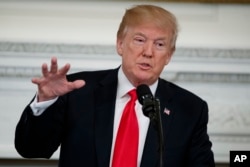A South Korean official says North Korea signaled there was no need to keep its nuclear program if military threats against the country are eliminated and indicated it is willing to hold talks with the United States.
"The North side clearly affirmed its commitment to the de-nuclearization of the Korean Peninsula and said it would have no reason to possess nuclear weapons should the safety of its regime be guaranteed and military threats against North Korea removed," South Korea's top security advisor, Chung Eui-yong, said at a media briefing in Seoul.
Chung's comments came after a senior South Korean delegation returned from a two-day visit to North Korea where they met with leader Kim Jong Un.
Chung said the two Korea's agreed to hold their first summit in more than a decade in late April. He added that Pyongyang also said it was receptive to discussing de-nuclearization and normalizing relations with the U.S.
Commenting on the recent developments on North Korea, President Donald Trump on Tuesday tweeted "We will see what happens." In a later tweet, he said "possible progress being made in talks with North Korea."
Earlier Tuesday, South Korean President Moon voiced optimism that improving inter-Korean relations can foster de-nuclearization talks between North Korea and the U.S.
Moon described Monday’s meeting in Pyongyang between South Korean special envoy and National Security Office head Chung and North Korean leader Kim, as the beginning of a broader diplomatic process.
After meeting with Moon, the special envoy will travel to Washington to brief U.S. officials.
KCNA, The North Korean official news agency, described the bilateral meeting in very positive terms, saying Kim Jong Un voiced his “firm will to vigorously advance" inter-Korean ties, that the participants discussed “easing the acute military tensions on the Korean Peninsula” and that they “made a satisfactory agreement.” An official in Seoul’s presidential Blue House said the “agreement” was referring to plans for a leaders summit and not talks with the U.S.
The cordial North Korean reception for the diplomatic envoy from Seoul was seen as a courteous response to South Korea’s hosting of the North’s delegation during the PyeongChang Olympics. The opening ceremony delegation included Kim Yo Jong, the sister of the North Korean leader. During her visit to Seoul, Kim conveyed an invitation to Moon to visit Pyongyang for a summit with her brother.
However, Moon has said the proper conditions must first be met before such a summit can be held, and has indicated those conditions include an agreement by the Kim government to engage with the U.S. in talks to end its threatening nuclear program.
Maximum prudence
The South Korean president has also urged U.S. President Donald Trump to lower the threshold for engaging in talks with North Korea. The Trump administration, however, has insisted that Pyongyang agree to halt its nuclear program before negotiations to end sanctions and normalize relations could begin.
North Korea has called the U.S. precondition for talks “preposterous.”
In the last two years, North Korea has launched numerous medium and long-range ballistic missiles and conducted two nuclear tests, in large part to develop an operational capability to target U.S. mainland cities with a nuclear-armed intercontinental ballistic missile.
The Trump administration has led international efforts to pressure Pyongyang to halt its nuclear program by imposing tough sanctions that ban billions of dollars worth of North Korean coal, iron ore, clothing products and seafood exports. The Trump administration has also said that, if necessary, it is prepared to use military force as well to eliminate the nuclear threat.
Moon Chung-in, a special advisor to South Korean President Moon Jae-in for diplomacy and national security affairs, has been critical of Trump’s “maximum pressure” approach, and has urged Washington to embrace a “maximum prudence” policy to find a diplomatic solution to prevent the potential for conflict.
Military exercises
Meanwhile, South Korea is in a race against time to advance U.S.-North Korea peace talks before tensions likely escalate again in April when joint military drills resume.
With its participation in the recent winter Olympics in South Korea, Pyongyang has been acting with restraint by suspending provocative missile and nuclear tests, and expressing a willingness to improve inter-Korean relations. The Kim government’s sudden embrace of bilateral cooperation is also likely part of a strategy to weaken international support for sanctions and split the U.S.-South Korea alliance.
The U.S. also contributed to the reduced tensions during the Olympics by agreeing to postpone joint military exercises.
But the Olympic truce could come to an end in April when the joint drills are expected to resume. Pyongyang has warned it will respond to the military exercises they claim are threatening rehearsals for invasion, possibly by resuming ballistic missile tests and setting in motion a new cycle of provocation and confrontation.
There has been speculation the drills could be further delayed or reduced in scope. South Korean National Defense Ministry refused to say whether the joint military exercises could be altered as part of a diplomatic deal.
Lee Yoon-jee in Seoul contributed to this report






